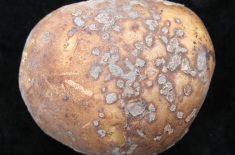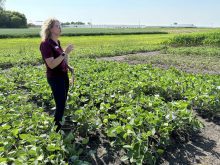Recently retired plant pathologists Andy Tekauz and Jeannie Gilbert will be replaced, but the positions will be in Morden, not Winnipeg
Agriculture and Agri-Food Canada isn’t easing up in the battle against fusarium head blight, says the director general for the department’s Prairie/Boreal Plain Ecozone.
“Fusarium work is a high priority,” said Stephen Morgan Jones. “It is, along with the rust diseases, a very high priority for us.”
Jones said two recently retired fusarium experts from Winnipeg Cereal Research Centre — plant pathologists Andy Tekauz and Jeannie Gilbert — will be replaced.
The centre is closing due to budget cuts, with 40 of its staff positions, including plant pathologists and genomics researchers, moving to the Morden Research Station and 20, including the centre’s four wheat and oat breeders, to the Brandon Research and Development Centre.
Read Also

Manitoba canola industry has new frontiers
Canola oil is still the main priority for the sector, but canola meal is increasingly the subject of research looking for new markets and uses for the oilseed’s byproduct.
“I would expect we’ll be advertising those (two pathology) positions sometime later on this summer and look for the persons to start up their programs at Morden next spring,” Morgan Jones said. “That’s what our plan is at the moment.”
In the meantime, other plant pathologists will continue to work on fusarium, including assessing new varieties of cereal grains for their susceptibility to the fungal disease, he said.
“We acknowledge that Jeannie Gilbert and Andy Tekauz were both important people, but we do have some other pathology support at Winnipeg,” he said.
Other federal scientists in Swift Current, Lethbridge and Ottawa also work on fusarium, he noted.
The government plans to spend about $10 million upgrading the Morden station to accommodate the additional staff; construct a new greenhouse and seed storage facilities; and upgrade laboratories, Morgan Jones said.
The wheat and oat breeders are going to Brandon because growing conditions in that area are more representative of Western Canada than Morden, which is famous for it’s garden-like microclimate. And since Morden’s climate is ideal for plant diseases, including fusarium and new races of rust, it’s a good place for plant pathologists to work.
“We wanted to keep our pathology group together because it is really our core pathology group for all of Western Canada,” Morgan Jones said.
The Winnipeg Cereal Research Centre, founded 90 years ago, gave birth to some of Canada’s best wheat varieties from Katepwa to Kane. But it was a logical place to close when the department was ordered to cut its budget by between five and 10 per cent, Morgan Jones said in an interview last year.
“I don’t think it’s a secret… the centre in Winnipeg is a facility that has probably gone 10 years past its useful life,” he said. “There just wasn’t $150 million available to go out and rebuild or replace the structure in Winnipeg.”
The closure and other cuts have some farmers worried about Ottawa’s long-term commitment to agricultural research. Wheats developed by federal plant breeders dominate western Canadian production.
Morgan Jones has said in the past the department’s vision is to move towards selling new wheat lines to private companies for commercialization in three to five years.
“We believe there is an opportunity for the private sector… to run that type of work probably more cost effectively than we can and then we can really put our emphasis on making more crosses and doing what we call the ‘public good stuff’ like keeping rust resistance genes available in our varieties so there is long-term protection in the industry,” he said in a 2012 interview.
“I think the fact that we haven’t had a serious outbreak of rust for over 50 years in Western Canada is a tribute to our investment in upstream plant disease work has been effective.”



















